Is equestrian endurance riding possible without crew?
Absolutely! Some riders actually prefer to ride without crew, while others appreciate the support that comes with having an individual or group dedicated to their success. This article discusses the advantages of each option, as well as tips for riding successfully both with and without crew.
Is it Better to Endurance Ride With or Without Crew?
Riding with and without crew are both valid options. At most “normal” rides (as opposed to highly challenging events, like Western States, or if you are trying to win), your horse can be perfectly well cared for regardless. The difference boils down to values and skill sets:
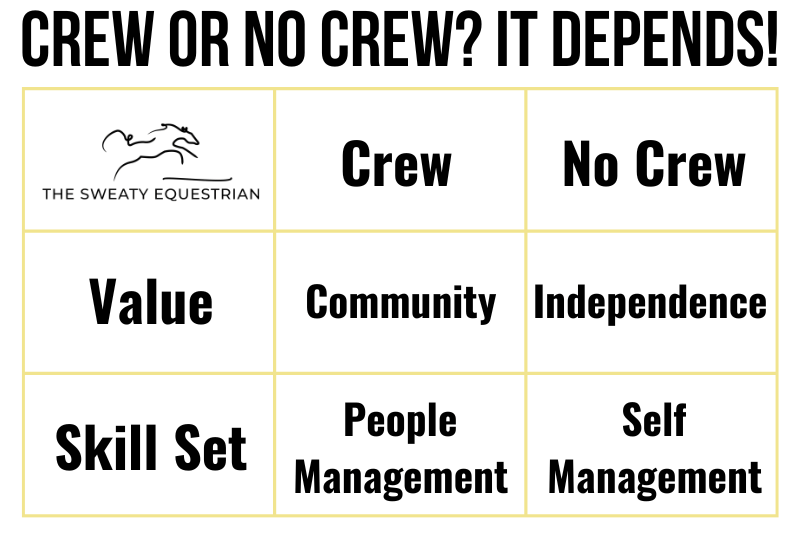
If you prefer to do things your way, with no obligation to give clear, kind directions to other people, having a crew might actually be stressful. However, if you thrive on camaraderie, conversation, and moral support, riding with crew could be great fun!
Of course, you may not have an option. If your spouse / mom / friends can’t or won’t come along on ride weekend, you get to ride without crew whether you want to or not. Conversely, some rides (especially long point-to-point ones) are more challenging to complete without crew, so you’re well advised to rustle some up.
The following tips will prepare you to handle both options:
Endurance Riding Without Crew
Like many endurance riders, I’ve completed most of my AERC miles without crew. All things considered, I actually find it easier, especially for distances shorter than 100 miles and/or if most holds are in camp.
Advantages of Riding Without Crew
The best feature of riding without crew is independence:
There’s no trying to find someone in a crowd, no answering questions or giving direction, no modulating your tone if you feel irritate or rushed, no need to worry about making sure your crew feels valued… You can just know what needs to be done and make it happen.
Riding without crew means you have a careful eye on your own horse almost 100% of the time. There’s nobody else to make sure he’s eating well, nobody noting how much he drinks, nobody assessing any signs of discomfort.
Personally, I like knowing that I’m maximally in tune with my horse rather than outsourcing to someone else who may not be an experienced horseman. (Hi, Mom!)
Riding without crew means nobody is moving your tack around or mixing mashes that may or may not already have electrolytes in them. Sometimes, it’s nice to know that things are exactly how you want them because you did it yourself.
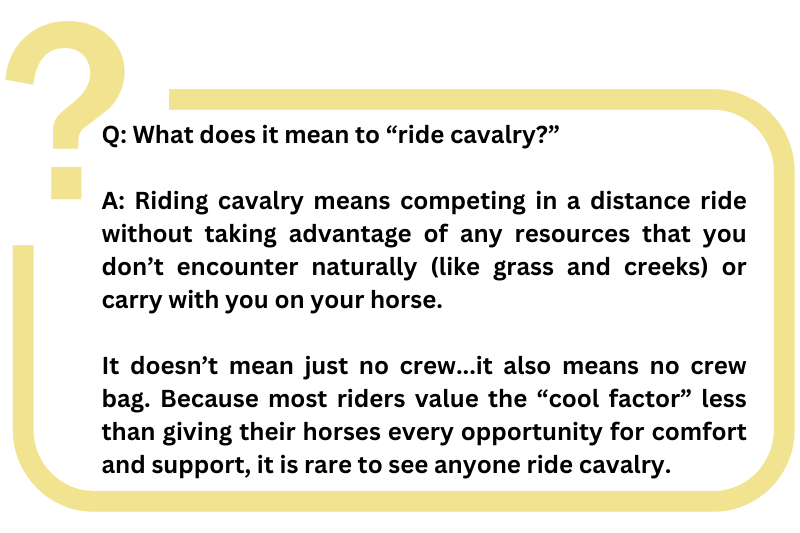
Tips for Successful Endurance Riding Without Crew
The key skill set for successfully riding without crew is self-management. You must be organized, physically capable of remaining active through the holds, and able to make good decisions under pressure.
Assuming you’re a typical rider seeking to complete (not necessarily compete) a loop-course ride of up to 100 miles, here’s how to succeed without crew:
Be Organized – Riding without crew means planning ahead. Always think through what you’ll need next: More soaked beet pulp? Full water bottles? A sponge, jacket, or headlamp? Posting checklists in your horse trailer and pre-mixing things like horse supplements can be very helpful.
Prepare Ahead – If something can be prepared ahead of time, do it! This means setting out your riding clothes the evening before, knowing what you’ll eat and where it’s located, pre-slicing foods like cheese and veggies, mixing horse feed, pre-filling hay bags and water bottles, etc.
Pack a Crew Bag (or two) – Crew bags can be useful even if all holds are in camp. You might not want to take the time to run all the way from the vetting area to your trailer and back during a brief hold.
If there are any out checks, you’ll definitely want a well-organized stock of items to support yourself and your horse. For details, check out How to Pack a Crew Bag for Equestrian Endurance Riding.
Be Physically Fit – Doing everything yourself, from resetting a hoof boot to running back for a forgotten bridle, all while scarfing your PBJ, means you won’t have much down time. The better your physical fitness, the easier it will be to push through long days with no real rest.
Train Your Horse to Tie – You’ll probably need to leave your horse to complete a few tasks, like taking a restroom break or digging out a spare hoof boot. While usually non-problematic, it’s possible that your horse could decide to do something undesirable, like roll with his saddle on, if you don’t manage him correctly. Having your horse trained to tie well helps a lot.
Build Your Knowledge – Since there’s nobody else dedicated to observing your horse or offering informed opinions, you’ll want to be confident in your ability to make good decisions. The more experience you gain, the better you’ll feel about being able to evaluate everything from your horse’s health to how many layers you should wear for the next loop.
Remember You’re Not Really Alone – Setting the benefits of independent operation aside, there will be times when you just need help. The good news is that endurance is a sport full of kind souls. Need someone to hold your horse while you go pee? Just ask! Wondering if your horse is okay even though he stopped eating halfway through the hold? Run it past the vet! Help is available if you need it. Just say the word.
How would it feel to ride with a mentor in your pocket? Now, you can! My Quick-Reference Guide has the answers for those "Wait, what do I do now?" moments, even without wi-fi or cell service. Grab yours today!
Endurance Riding With Crew
These days, I usually do have crew because Mr. Sweaty enjoys coming along to rides. I must admit, it’s lovely to see a friendly face waiting with horse blankets and an insulated mug when I drag in from a long, rainy loop!
Advantages of Riding with Crew
The best feature of riding with crew is community:
You have moral support when you’re struggling and someone to celebrate with when things are going well. You also have access to second opinions and a backup memory. (What color ribbons are on the next loop, again?)
On the practical front, riding with crew means you have someone to hold or watch your horse when you step away. You have a runner to fetch items you forgot or didn’t expect to need. You have someone to manage a buddy horse if your mount won’t settle without one. And, you’ll likely have time to sit down while someone else handles the work.
Tips for Successful Endurance Riding With Crew
The key skill set for successfully riding with crew is people-management. You must be a clear communicator, capable of seeing the world through others’ eyes, and able to remain kind under pressure.
Of course, if you are taking on a highly challenging or competitive event, you’ll want a crew with plenty of endurance riding experience. However, even non-horsepeople can be very helpful if you manage the situation correctly. Here’s how to do it:
Give Clear Instructions – You know your horse best, and you also know how you want things done. However, your crew cannot read your mind. For the things that really matter, like your horse’s mid-ride mash recipe, be sure your crew has clear instructions and understands your priorities.
Avoid Micro-Management – On the flip side, be prepared to let go of the things that don’t really matter. So your crew used the sponging bucket for drinking water or cut your Monterey jack into cubes instead of slices. Is it worth getting upset over? As long as the real needs get met, maintaining harmony is more important than doing everything exactly as you’d have done it yourself.
Communicate Your Needs – Your crew has been waiting for hours specifically to help you out, so let them know how they can be most effective. If you’re feeling faint, ask someone to bring you a chair and electrolytes. If you need some space to decompress or concentrate without answering questions, kindly say so.
Set Realistic Expectations – Before the ride, be sure your crew knows about any tendency you have to get grumpy, anxious, forgetful, self-centered, or demanding. Let them know that you’ll do your best not to take out any weariness or stress on them, but if you do, it’s not their fault. You can also let them know how best to support you (food? alone time? reminders?) when things get tough.
Be Kind – Do your best to treat your crew with kindness, respect, and gratitude regardless of how you feel or how your day is going. Let them know how much even the apparently-small stuff, like keeping an eye on the clock, really helps.
Ensure Their Needs are Met – Your crew will be better able to assist you, not to mention happier, if they get enough snacks, hydration, shelter, and recognition. Even though it can feel like an expenditure of emotional energy that you just don’t have, it’ll actually make you feel better (or at least, not worse) to know you’ve helped support them as they support you.
The Choice is Yours
In the vast majority of cases, endurance riding is safe and enjoyable both with and without crew. Whichever you choose, a little forethought will go a long way toward a fulfilling experience for everyone involved — whether they have two legs or four.
Don’t miss out out on subscriber-only content! Receiving The Sweaty Equestrian newsletter is like getting two, extra blog posts per month, straight to your inbox.
You might also like
This post may include affiliate links, and I may earn a small commission (at no extra cost to you) when you purchase through these links. I only recommend products and services I think are helpful and useful. Thanks for helping me offset the cost of maintaining this blog as a free resource!

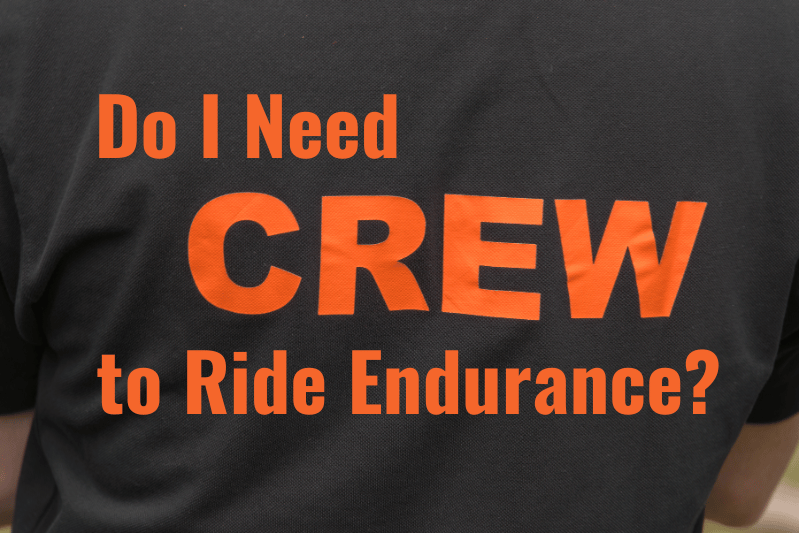
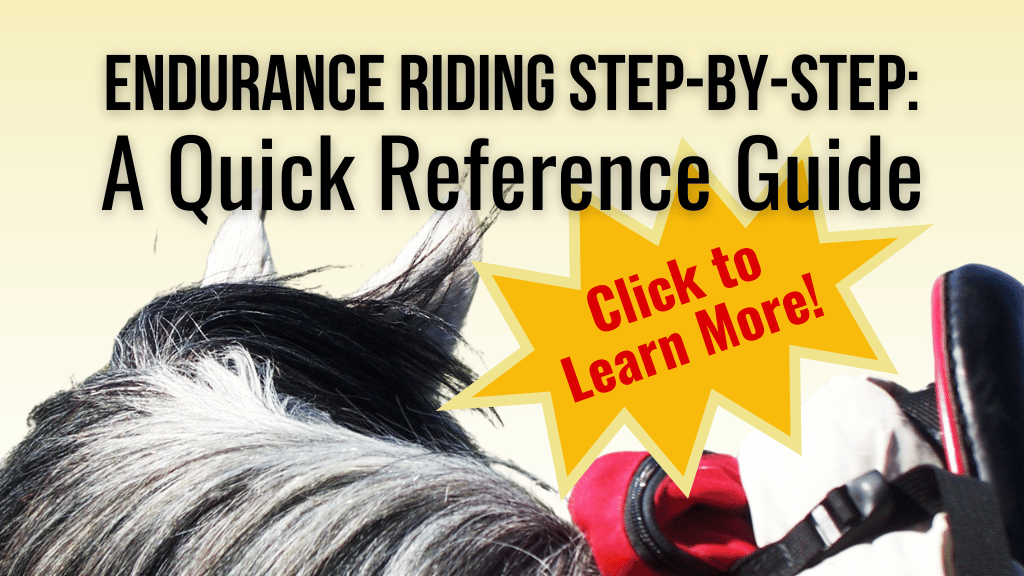

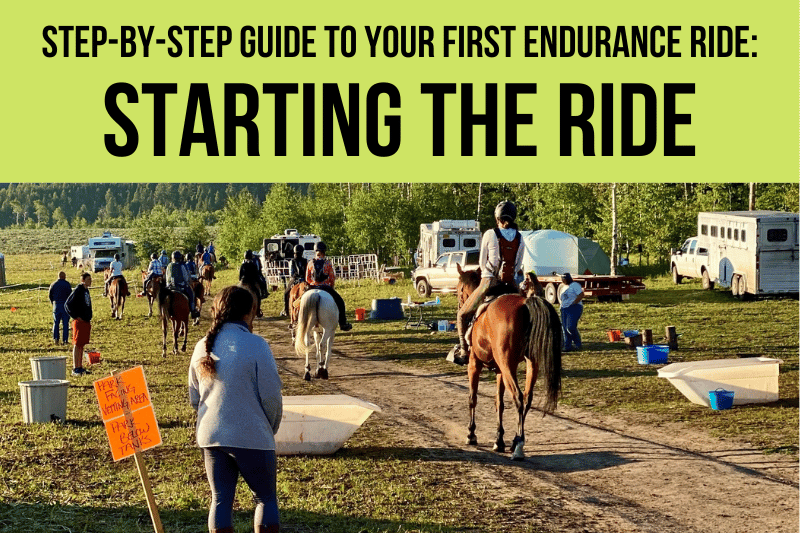

I found that if you are lucky enough to have multiple crew, assigning roles is really helpful. In a perfect world for example I will have one person assigned per horse, then my hubby who wants nothing to do with the horse is in charge of feeding everyone on the team and keeping up with the dishes. I make him a meal plan and do all the shopping beforehand and he likes being the most important person on the team 😛 lol
I love this! My husband takes on the food prep, too, and it is a huge help.